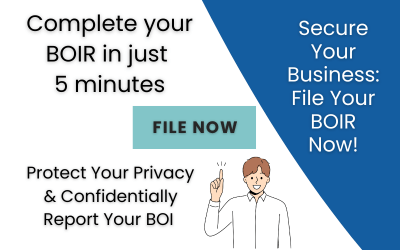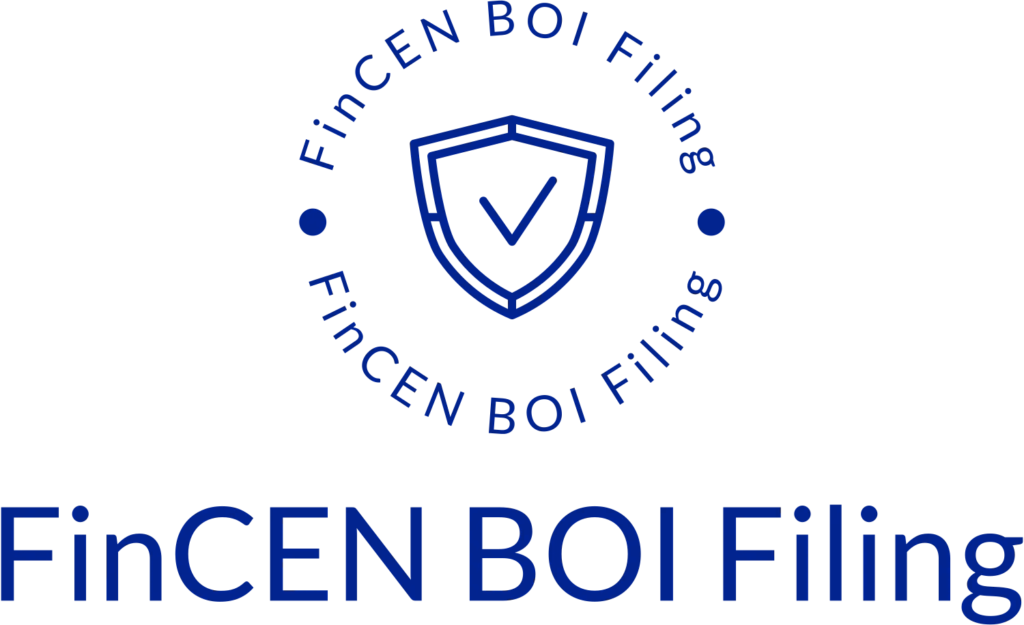As a business owner, you may be concerned about how to keep your personal information private when filing a Beneficial Ownership Report (BOIR). While the Corporate Transparency Act (CTA) requires companies to report beneficial ownership information to the Financial Crimes Enforcement Network (FinCEN), there are ways to protect your personal details from public exposure. This blog post will explore various methods, including using registered agents, owning the company in a trust, and other strategies to maintain your privacy.
Understanding Beneficial Ownership Reporting
The CTA, effective January 1, 2024, mandates that most U.S. entities report their beneficial owners to FinCEN. This requirement aims to increase transparency and combat illicit activities such as money laundering and tax evasion by revealing the true owners of companies. While the information is reported to FinCEN, it is not publicly accessible. However, business owners may still seek additional privacy measures to protect their personal information.
Who Has Access to Your BOI Report Information?
While discussing privacy concerns, it’s crucial to understand who can access the information you submit in your Beneficial Ownership Information (BOI) report. Many business owners worry that this sensitive data might become public, but the reality is quite different.
Restricted Access
The Corporate Transparency Act, which mandates BOI reporting, includes strict protocols for protecting the confidentiality of the reported information. Here’s what you need to know about access to your BOI data:
- Not Publicly Accessible: Unlike some business filings, BOI reports are not public records. The general public cannot access this information.
- FinCEN Control: The Financial Crimes Enforcement Network (FinCEN) collects and manages BOI reports. They have primary access to the information.
- Law Enforcement and National Security: The data is intended for use by law enforcement agencies, national security agencies, and other authorized government bodies. However, they can only access it for specific purposes related to national security, intelligence, and law enforcement activities.
- Financial Institutions: In certain circumstances, financial institutions may have access to beneficial ownership information. However, this access is limited and requires the consent of the reporting company.
Strict Confidentiality Measures
FinCEN has implemented robust security measures to protect the confidentiality of Beneficial Ownership Information (BOI) data, ensuring it is safe from unauthorized access or disclosure. At FinCEN BOI Filing, we have established a secure API credential that seamlessly connects with the FinCEN BOI Reporting System. Our user-friendly form is designed to collect only the essential information needed for your report, without storing any data on our system. This approach guarantees that when you file a BOI report through our service, your personal information remains private and secure.

What This Means for You
While you are required to provide accurate information in your BOI report, you can take comfort in knowing that this information is not freely available to the public or businesses. The restricted access ensures that your personal details are protected from general scrutiny while still serving the law enforcement and national security purposes intended by the Corporate Transparency Act.
Safeguarding Your Personal Information from Public View
While the BOI report information is protected from general public access, many business owners still prefer to keep their personal details as private as possible in other aspects of their business operations. With that in mind, let’s explore several strategies you can employ to further safeguard and protect your information from the general public. These methods can help maintain your privacy in public records and business dealings, even as you comply with BOI reporting requirements. Here are some effective approaches to consider:
Using Registered Agents
One effective way to keep your personal information private is by using a registered agent. A registered agent is a third-party individual or service that receives legal documents and government notices on behalf of your business. Here’s how it helps:
- Address Privacy: Instead of using your home or business address, you can use the registered agent’s address for official correspondence, keeping your personal address confidential.
- Professional Representation: Registered agents provide a layer of professionalism and can help manage compliance requirements efficiently.
Benefits of a Registered Agent
- Privacy Protection: Your personal address remains private, reducing the risk of unwanted attention or security threats.
- Compliance Assistance: Registered agents ensure that you receive important legal and tax documents promptly, helping you stay compliant with state and federal regulations.
- Convenience: They handle the paperwork, allowing you to focus on running your business.
Owning the Company in a Trust
Another method to maintain privacy is by owning your company through a trust. A trust is a legal arrangement where a trustee holds and manages assets on behalf of beneficiaries. Here’s how it works:
- Anonymity: The trust, rather than you appears as the owner of the company in public records.
- Control: You can still retain control over the company’s operations and decisions as the trustee or through specific trust provisions.
Types of Trusts for Business Ownership
- Revocable Trust: Allows you to retain control and make changes to the trust during your lifetime. However, it may offer less privacy since it can be altered.
- Irrevocable Trust: Provides greater privacy and asset protection since the terms cannot be easily changed. The trust itself is the owner, offering a higher level of anonymity.
Using a FinCEN Identifier
A FinCEN Identifier is a unique 12-digit number issued by FinCEN to individuals or entities. This identifier can be used in place of personal information when filing a BOIR. Here’s how it helps:
- Privacy: Instead of submitting personal details repeatedly, you can use the FinCEN Identifier, which links to your information securely stored by FinCEN.
- Efficiency: Simplifies the reporting process, especially for individuals with multiple beneficial ownership interests.
How to Obtain a FinCEN Identifier
- Application: When submitting a Beneficial Ownership Information Report through our secure system, you can request a FinCEN Identifier for use in future BOI reports. This identifier is particularly advantageous for individuals associated with multiple entities that have BOI reporting requirements.
- Usage: Once issued, use the FinCEN Identifier in your BOIR filings instead of personal information.
Additional Strategies for Privacy
Using a Nominee
A nominee is an individual or entity that acts on behalf of the actual owner. Here’s how it works:
- Anonymity: The nominee’s name appears in public records, shielding the actual owner’s identity.
- Legal Agreements: Ensure that legal agreements clearly define the nominee’s role and responsibilities to protect your interests.
Structuring Ownership
Consider structuring your business ownership through multiple layers of entities. Here’s how it helps:
- Complex Ownership: Using multiple LLCs or corporations can make it more challenging to trace ownership back to you.
- Legal Protection: Each entity provides a layer of legal protection and privacy.
Regular Updates and Reviews
Regularly review and update your privacy strategies to ensure they remain effective. Here’s how:
- Compliance: Ensure all entities and trusts are compliant with current laws and regulations.
- Adaptation: Adjust strategies as needed to address changes in laws or business circumstances.

Final Thoughts On: How to Keep Your Personal Information Private When Filing a Beneficial Ownership Report
While the Corporate Transparency Act requires beneficial ownership reporting to FinCEN, there are several ways to keep your personal information private. Using registered agents, owning your company through a trust, obtaining a FinCEN Identifier, and employing other privacy strategies can help protect your personal details from public exposure. By taking these steps, you can comply with the law while maintaining your privacy and security.
Take the next step towards protecting your privacy and complying with the Corporate Transparency Act. Use our secure system to file your Beneficial Ownership Information Report (BOIR) today. It’s easy and efficient—click here to get started and safeguard your personal information with confidence.





